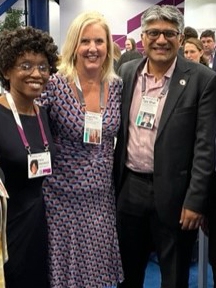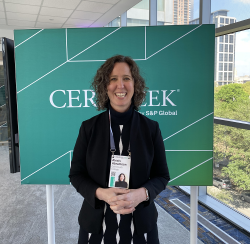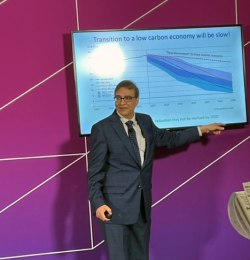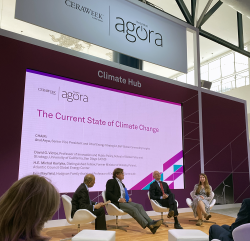
- About
- Education
- Research
- Engagement & Collaboration
- News & Events
Back to Top Nav
Back to Top Nav
Back to Top Nav
Back to Top Nav
How has the energy industry been impacted by the global pandemic, shifting geopolitics, and threats to energy security? How can we meet the world's growing energy demands while reducing emissions and redesigning the world's energy systems for a lower carbon future? In early March, more than 8,000 people gathered in Houston, TX to explore these questions and learn about the technological, financial, and political strategies and solutions that are shaping the global energy transition at CERAWeek '23.

CERAWeek, one of the world's most significant climate and energy conferences for industry and government leaders, was not only the largest CERAWeek gathering so far, but it also saw the largest delegation of Dartmouth representatives to date. The Arthur L. Irving Institute for Energy and Society led a group of Dartmouth faculty, students, and staff from the Revers Center for Energy, Sustainability, and Innovation at Tuck, the Magnuson Center for Entrepreneurship, and the Office of Entrepreneurship and Technology Transfer, to help foreground the College's expertise on energy and climate and connect and reconnect with alumni and friends across the energy and climate sector. The delegation also gathered new insights into the energy and climate challenges and solutions on the horizon to help feed back into research, teaching, and entrepreneurship happening on campus.
The week-long event was packed with opportunities to hear from Dartmouth alumni experts in the energy and climate space, such as Abby Hopper '93, CEO of the Solar Energy Industries Association (SEIA) and Thad Hill TU'95 CEO of Calpine, as well as some of the most high-profile voices in energy and climate today, including US Secretary of Energy Jennifer Granholm, Special Presidential Envoy for Climate John Kerry, and US Department of Energy Loans Programs Office Director Jigar Shah. Conference talks and panels represented a diversity of energy and climate topics, but Dartmouth delegates noted a significant focus on green hydrogen, geothermal, carbon management, workforce development, and social equity, signaling the increasingly important role these areas are playing in energy.

For Thayer School of Engineering Dean Alexis Abramson, who participated in a panel titled, "Energy Efficiency and Making the Built Environment," the conference offered an inspiring opportunity "to be among a community of energy-minded thought leaders, working across the technology, policy, or business arenas with a collective aim to address the energy and climate issues facing humanity."
Earth Sciences Professor Mukul Sharma, described his experience at CERAWeek23 as "exhilarating" and noted how unique and valuable it was to have representatives from all corners of energy — "CEOs of major oil and gas firms, tech firms, authors, politicians, senior federal officials, and innovators of green technology" — in one place. "There was palpable excitement about the energy transition (no doubt spurred by the Inflation Reduction Act) and concern about how net zero will be achieved by 2050," said Professor Sharma. "I took part in a panel discussion ["Oceans and Climate: Innovation Solutions"] and also gave a talk about the carbon dioxide removal strategies we are developing at Dartmouth. This generated a lot of interest, and I now have three investors and a technology company wanting to work on these strategies with me."

The Irving Institute was also delighted to help support the participation of three Dartmouth student delegates. Master of Engineering Management (MEM) student Filip Nowicki, was heartened by what he saw as a general consensus among academics, government officials, industry giants, start-ups, and innovators at the conference, on a path toward achieving a sustainable energy future. "According to the speakers," noted Filip, "the path comprises a basket of technologies and applications feasible at scale, including hydrogen for power and heat generation, sustainable fuels for transportation, carbon capture for heavy industry, AI-powered emission leak monitoring, and more. While developing and transitioning to these technologies will be a process, the fact that there is a relatively clear roadmap that industry stakeholders agree on is encouraging about the future."
For Prutha Atria, a student in the MEM program and licensing intern for Dartmouth's Technology Transfer Office, a big takeaway from her time at the conference was the need to accelerate global collaboration to address climate change. "Technology transfer, financing, and equitable policy are necessary to foster the right collaboration between countries to tackle climate change," she said.

Vanessa Pinney '22, TH'23, who recently finished the MEM program, noted an emphasis at the conference on new and emerging technologies to address oil and gas emissions. "Most of the large players in the oil and gas industry are significant investors in novel technology to green their operations and supply chains. Several companies with presences at CERAWeek Agora sponsored 'houses' to demonstrate some of these novel technologies. Hydrogen production and distribution, high-precision pipeline monitoring, and direct-air carbon capture are all particularly popular targets for investment."
For Irving Institute Executive Director April Salas, the prominence of the CERAWeek Innovation Agora and the overall focus on the energy transition and innovation in climate and energy technology, marked a new and important chapter in the long-standing conference's history. "The critical mass of leaders across industry, government, and NGOs gave our delegation a unique perspective on what's on the horizon for energy, climate and society," she said. And while colleges and universities do participate in the conference, she continued, "events like CERAWeek present a valuable opportunity to strengthen and build connections beyond academia. Meeting the enormous, complex, and urgent challenge of climate change requires sustained collaboration and focus, across disciplines, industries, governments, and societies. CERAWeek was a wonderful chance to continue building these collaborations and partnerships and for Dartmouth to support such a strong showing at this year's event signals our commitment to being a leader in climate and energy solutions."